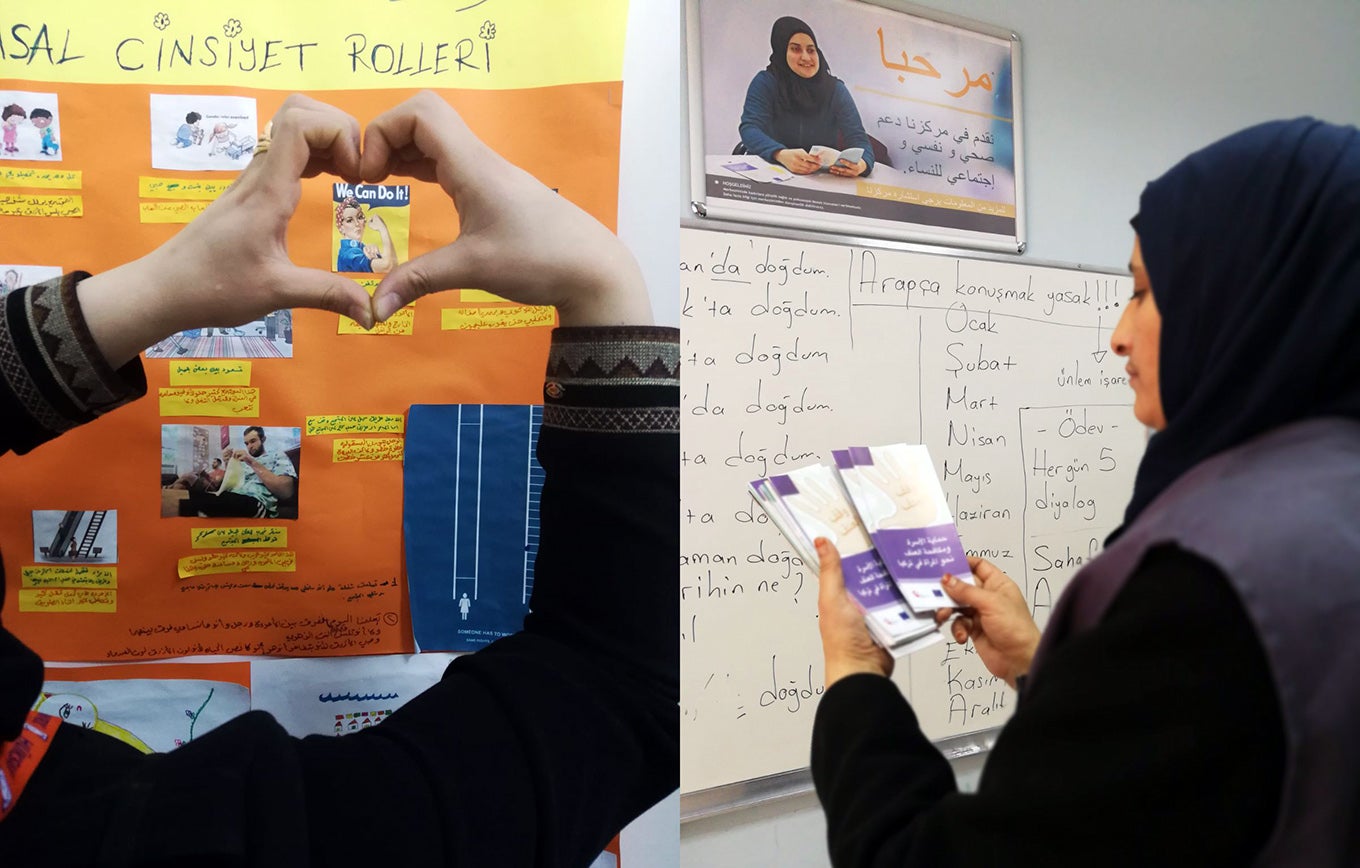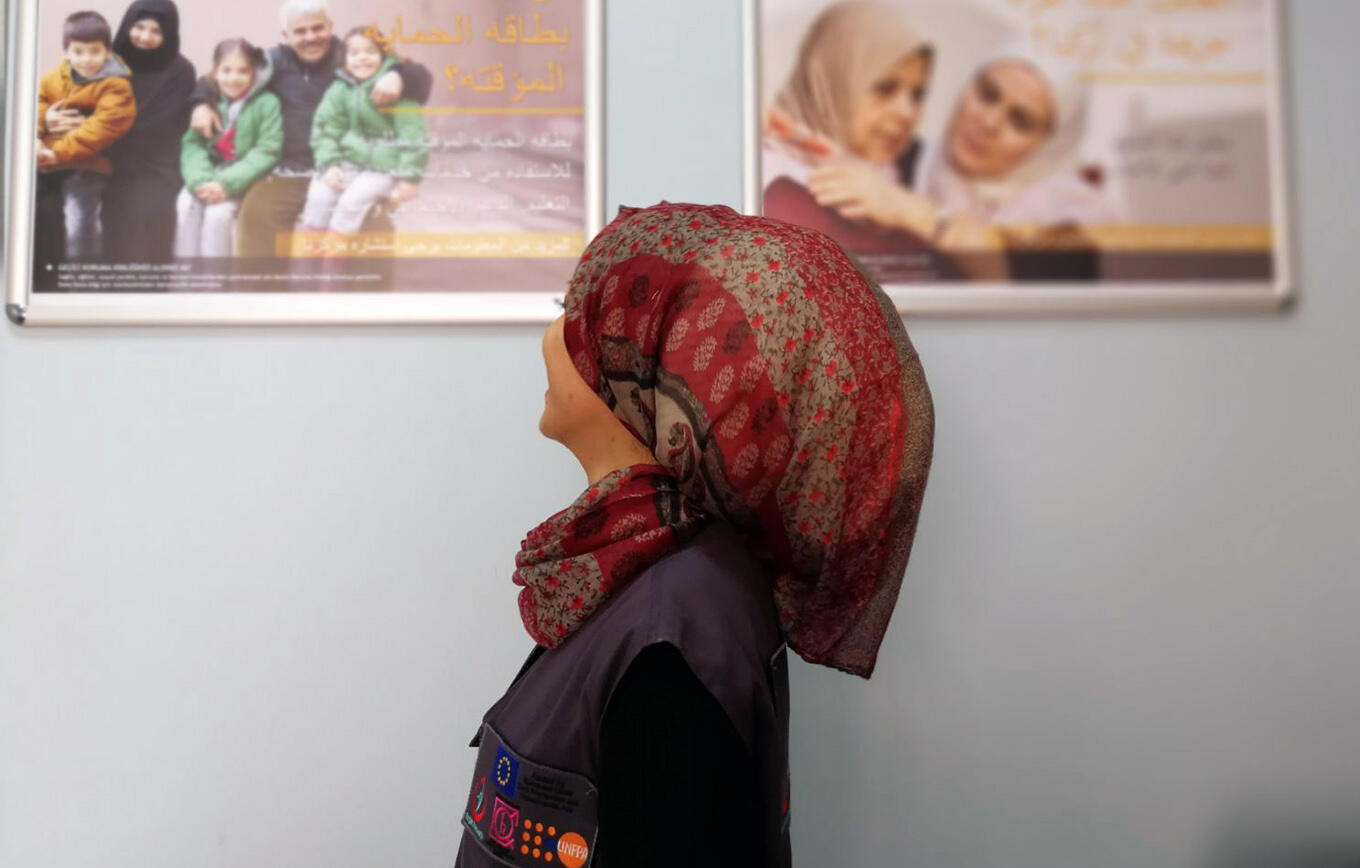ANKARA, Turkey — When Amira* was 14 years old and growing up in Syria, she agreed to marry a man she didn’t love to fulfil her dying mother’s wish to witness her daughter’s wedding day. But once they were married, Amira’s husband kept her from visiting her mother and her other family members. Then he began to beat her. The violence escalated steadily until one day Amira, then pregnant with her second child, tried unsuccessfully to take her own life by stabbing herself with a knife.
The ongoing conflict in Syria, which Amira says exacerbated her husband’s violence at home, eventually drove the family to flee to Turkey. Now that they are in a safe place, Amira says, her husband’s abuse has stopped, and the 26-year-old mother of three has turned her life around.
“When I came to Turkey as a refugee, I didn’t have anything to hope for; I had no one to count on and I was scared of everything,” Amira recalls. “I couldn’t speak the language so whenever I was asked a question, I just nodded silently. I felt like there were a billion things happening around me that I wasn’t part of, or even aware of –like the world existed without me.”
Amira is now trying to help other women in similar situations as a health mediator at one of the 39 Women and Girls Safe Spaces that UNFPA has set up since 2017 in cities around Turkey. These centres are operated with the support of ECHO, the European Commission’s European Civil Protection and Humanitarian Aid Operations, and the governments of Japan and Sweden.
Amira first visited a Women and Girls Safe Space to get information on vaccinations for her children. The next time she came into the centre, she asked to talk to a social services staff member; later, she attended a training session there. Slowly but surely, Amira became a familiar face around the centre, and eventually felt comfortable enough to talk to the on-site psychologist.
“The more I talked to the staff at the Women and Girls Safe Space, the more I felt liberated,” Amira says. “As they gave me guidance, I shed my fears one by one.”
As Amira learned Turkish and gained confidence in herself, she wanted to help other Syrian women who were still stuck at home, afraid and unable to take the necessary actions to improve their health and become more engaged in the community. She applied for and got a job as a health mediator, one of 166 Syrian women trained and employed to help connect members of the refugee community in Turkey with the sexual and reproductive health and psycho-social support services available at the Women and Girls Safe Spaces.
“When I finally landed a job, I felt like I had been reborn, because I could finally support myself and make my own decisions on how I should run my life,” Amira says. “I am part of the community I live in and my children are proud of me. Thanks to my new friends at the Women and Girls Safe Space, I got a second chance in life.”
‘I cannot sit still; I always want to do something good’
Fatima*, another health mediator, also suffered severe domestic violence and abuse during her two marriages in Syria. After the war broke out, the mother of five lost her oldest son when a bomb hit their home. Fatima was also wounded in the attack but survived. The violence around her intensified to the point that when Fatima was pregnant with her youngest child, she was not able to get medical attention while she was in labour. She gave birth without any assistance, mimicking what she had seen the midwife do during her previous deliveries. She spent the night alone with her newborn in her arms until her husband returned to their home the next morning and took them to a hospital.
Fatima tried twice to escape over the border to Turkey with her children, succeeding on her second attempt and travelling to Ankara where her older brother lived. After some time in a more peaceful environment, Fatima started to feel like she could stand on her own two feet. She wanted to learn Turkish so that she could find a job and expand her life by getting to know more people.

Amira (left) and Fatima (right) also work as health mediators at Women and Girls Safe Spaces in Turkey, helping other Syrian women. Photos: UNFPA Turkey
One day, she took her children to a UNFPA-supported Women and Girls Safe Space for vaccinations and saw other Syrian women leaving a classroom. Curious, Fatima asked what they were doing and immediately signed up when she was told that the class was for learning Turkish.
Eventually, Fatima became a health meditator at the centre, a job that has allowed her to send her children, who were previously working, back to school now that she can support the whole family on her own. When her husband, who had stayed behind in Syria, demanded that she send her eldest daughter back to be married off, Fatima refused; the girl is still in school in Turkey along with her siblings.
“The job has so empowered me that I can’t sit still at home even on weekends because I always want to do something good,” says Fatima. “I’m so different now – I was an introvert and now I like to meet new people every day. I feel like this city cured me; I’m more optimistic about the future. I want to see my children graduate, see them prosper and live happy lives.”
From ‘house arrest’ to fulfilling her dreams
When Rima*’s father passed away, the 13-year-old’s independent, happy life in Syria died as well. Her uncles took charge of the family and imposed strict rules; Rima was taken out of school at the age of 14, and then prohibited from going outside at all. “It was like a house arrest,” she says.
At the age of 16, Rima was forced to marry. She gave birth to two children, a boy and a girl, but her husband verbally and physically abused her. When she asked for a divorce, he refused and became even more violent. After the family had fled to Turkey and while Rima was pregnant with her second child, she tried to kill herself by overdosing on pills, but she was found in time and taken to a hospital where her life was saved.
The 22-year-old mother of two had learned Turkish while still in Syria, so when her husband’s abuse continued, so was able to seek help from the Turkish authorities, first to get accepted in a women’s shelter and then to apply for a divorce. As a result of intimidation on the part of her husband and his family, however, Rima lost custody of her children.
Liberated from the violence of her marriage, Rima got connected with a nearby Women and Girls Safe Space and due to her bilingual skills, was eventually hired as a health mediator there. She now helps other refugee women stand on their own feet and develop new skills so that they can adapt to a new culture and be productive members of the community. Thanks to the income she is earning and the legal support she has received from the centre, she is also ready to resume the court battle to get custody of her children once again.
“Now I am seeking a new home where I can live happily with my children, and I am studying to work as a translator,” Rima says. “Thanks to all the help provided by the staff at the Women and Girls Safe Space, I will finally have the life of my own that I have been dreaming of for so many years.”
* Names have been changed to protect the women’s privacy.



